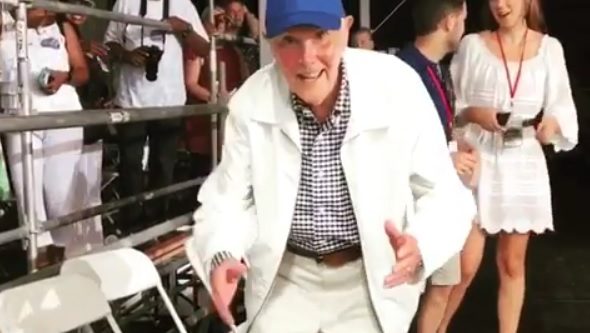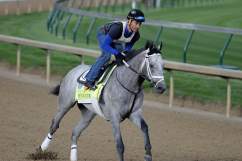Harry Connick Jr., who will perform the National Anthem at the 2017 Kentucky Derby and the host of the daytime talkshow Harry, is the son of Harry Connick Sr.
While his son gained fame as a singer, Connick was the District Attorney of Orleans Parish in Louisiana from 1973 to 2003. Connick turned 91 years old on March 27.
Connick was born Joseph Harry Fowler Connick in Mobile, Alabama. He served as a member of the Democratic party and his tenure was not without several controversies. In 2003, he retired and became a member of the Louisiana Political Museum and Hall of Fame.
Here’s what you need to know about Harry Connick Jr.’s father.
1. Connick’s Been Married Twice & Also Has a Daughter Named Suzanna
After serving in the U.S. Navy during World War II and joining the U.S. Army Corps of Engineers, Connick married his first wife, Anita Livingston. In an interview with Paul Leslie, Connick said they married in Tangier and he later served in Casablanca. Eventually, they settled in New Orleans, where Connick grew up.
At first, the couple decided to run a record store. After opening a second shop, they decided that this wasn’t what they wanted to do with their lives. Instead, they both went into law. After they both earned their degrees, they had two children – Harry Connick Jr. and daughter Suzanna.
Anita died in 1981 at age 55, following a battle with ovarian cancer. Connick Jr. was just 13 years old at the time.
“It was unquestionably the hardest thing that’s ever happened to me before or since. You just take what you’re given and accept it with grace and try to move on with your life.” Connick Jr. told People Magazine in 2016.
In 1995, Connick married Londa Jean Matherne.
2. Connick Was Accused of Not Handing Over the Key Evidence That Eventually Exonerated John Thompson
Although Connick found a place in Louisiana’s Politics Hall of Fame, his office faced several controversies during his three-decade tenure as the Orleans Parish District Attorney. The parish includes the City of New Orleans.
There was the case of John Thompson. In 1984, when he was 22 years old, Thompson, an African-American man, was charged with killing a New Orleans businessman. After his picture was published in a newspaper, three victims of an armed robbery claimed that Thompson was the robber. So, Connick tried Thompson for the robbery first because he felt it could be easier to get the murder conviction. After being sentenced to 50 years in prison for the robbery, he was later sentenced to death for the murder.
During the trial, Connick’s office suppressed a blood sample test that would have exonerated him for the robbery. If he wasn’t convicted for the robbery, he would have been able to properly defend himself during the murder trial. In 2002, the murder case was retried and he was found not guilty.
Thompson later sued Connick and won a $14 million verdict. But in 2009, the Supreme court overturned that verdict in a 5-4 decision in Connick v. Thompson. The majority opinion, written by the conservative members of the Court, found that a single violation of Brady v. Maryland (which states that a prosecution cannot withhold evidence from the defendant) was not enough to prove a pattern of suppressing evidence.
3. Connick Defended His Record Against Critics, Including Ruth Bader Ginsburg, who Called Him ‘Deliberately Indifferent’
In her blistering dissent in Connick v. Thomspon, Justice Ruth Bader Ginsburg accused Connick of being “deliberately indifferent to an obvious need for” Brady v. Maryland training to make sure other prosecutors in his office understood that decision. Ginsburg wrote that Connick was “the Office’s sole policymaker,” and placed the full blame on his office’s inadequacies on him.
“Connick was the Office’s sole policymaker, and his testimony exposed a flawed understanding of a prosecutor’s Brady obligations,” Ginsburg wrote. She noted that Connick himself admitted in the past that many of his prosecutors were just out of law school. She noted that there was a “huge turnover” that allowed those with little experience to move quickly up the ranks.
In 2012, The Supreme Court also overturned the quintuple murder conviction of Juan Smith in 1995. That decision was more lopsided, with Justice Clarence Thomas as the only dissenting vote.
In a 2012 interview with the Times-Picayune, Connick defended his reputation.
“My reputation is based on something other than a case, or two cases or five cases, or one interception or 20 interceptions. Look at the rest of my record. I have more yards than anybody,” he said. Connick also told the Times-Picayune that attorneys in his office knew hoe important Brady was.
“To suggest a criminal lawyer in my office didn’t know of their obligation to turn over Brady material is absurd. It’s such a naive statement,” Connick said in 2012. “I can’t attribute malice to those decisions as some people do. As the dissenters in the Supreme Court do, particularly Ginsburg. It reaches a level of hysteria. What’s burning in that woman is a very liberal flame that doesn’t contemplate the whole picture.”
Convictions under Connick’s watch continue to be overturned. For example, in 2014, Reginald Adams was released from prison after being convicted of killing a woman in 1979.
The current Orleans Parish D.A., Leon A. Cannizzaro Jr., tried out a venture with the Innocence Project New Orleans to investigate more possible wongful convictions. However, that project stalled in January 2016 when the City Council declined to keep funding it.
4. Connick Has Recorded 2 Albums & Also Sings Standards
Connick might not have the same success with music as his son has had, but he still sings. The father-and-son duo also founded the Krewe of Orpheus in 1993, as the first superkrewe to include both men and women members.
He has also recorded two albums. In 1996, he released All of Me. Two years later, he released New Orleans… My Home Town. He didn’t start working as a professional singer in New Orleans clubs until 1990.
In his Paul Leslie interview, Connick said music was an important part of his life as a kid. He listened to Glenn Miller, Rudy Vallee, Bing Crosby, Rus Morgan, Guy Lombardo, Benny Goodman and many others.
“Growing up in New Orleans you’re exposed to this music,” Connick told Leslie. “There’s a certain sound to most of that music. They call it a street beat. When I started to work, about 1990, I think I was 65 then. It’s a hell of a time to get started in a singing career, but it came about quite by accident.”
5. Connick Is a Devout Catholic, But Harry Connick Jr. Didn’t Become a Catholic Until 14
In several recent interviews, Harry Connick Jr. has spoken about how important his Catholic faith is. In an interview with America: The Jesuit Review, Connick said he was not baptized as a baby and didn’t become a Catholic until 14. His mother was raised Jewish and she wanted her children to decide for themselves.
“There are advantages and disadvantages about that, and I think the disadvantages probably outweigh the advantages,” Connick Jr. told the Jesuit Review. “But the advantage is that you call into question a lot of things that you probably would just take for granted had you been baptized, and confirmed, and gone to catechism as a young person.”
In an interview with the Christian Post, Connick Jr. said that his father is a devout Catholic.
“I talk to my dad, and my dad is a devout Catholic,” Connick told the Catholic Post. “He calls me Thomas sometimes [as in doubting Thomas], because I ask him questions, and we talk about different things about faith. He says, ‘How are you doing Thomas?'”





